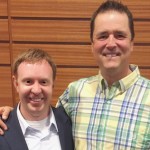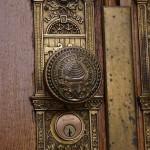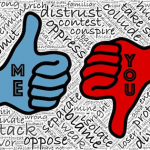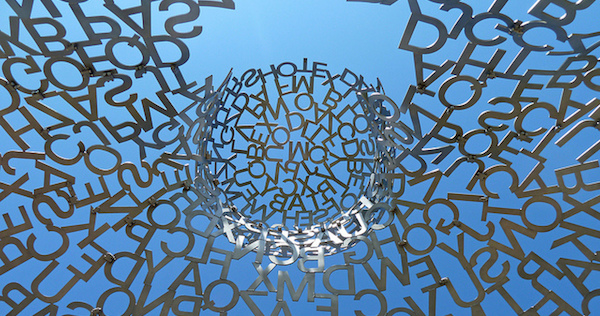
JOHN DEHLIN, psychologist and social activist, post-Mormon, founder of Mormon Stories Podcast: Patrick – As we begin this series, to me it seems fitting to begin with a discussion about epistemology. Since you are the religion scholar, do you mind sharing your understanding of what that word means? Then I’d like to ask you a few questions about it.
PATRICK Q. MASON, Chair of Mormon Studies and Associate Professor of Religion at Claremont Graduate University: That’s a great place to start. In short, epistemology is just a fancy term that means “how we know what we know.” It has to do with theories of knowledge. In other words, if I make a claim about something in the world, how did I acquire that knowledge, and upon what grounds am I making that claim? What processes of knowledge acquisition and interpretation lead me to say “the sky is blue,” or “Jesus was resurrected”? It’s important to be clear about this, because not everyone shares the same experiences or assumptions.
John: Perfect. That’s a great explanation. Thank you. So here’s my starting question to you: As “believers” and “non-believers” often attempt to discuss religion in general — and Mormonism specifically — so many of these conversations seem to come down to conversations about differing epistemologies.
In other words, a non-believer might say: “Look at all the historical and cultural problems with the LDS Church! There’s Book of Abraham and Book of Mormon historicity…polyandry and peep stones…the church’s treatment of LGBT people, feminists, and intellectuals, etc… All of these problems PROVE the LDS church is false and harmful to people I love!”
Then it is very common for believers to respond, “Well….I’ve had very sacred spiritual experiences in my lifetime that have testified to me that the [LDS] church is true….therefore those historical or cultural issues may be important to you, but to me, they have nothing to do with the spiritual witness that I’ve received.”
From a non-believing perspective — and I will admit up-front that this is a very fraught over-simplification — believers seem to base their positions on “spiritual experiences,” which non-believers would likely describe as emotional experiences, while non-believers often view themselves as basing their positions more on facts/evidence, maybe with a little bit of emotion thrown in.
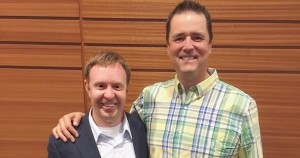
So my first question to you: Upon what is your epistemology based, and how do we engage in a constructive conversation if our epistemologies differ in substantive ways?
Patrick: Those are great questions. Let me chew on the first one first — and I’ll want to hear your response to your own question too! — and then we can dive into the second together.
I don’t think I approach the world with a single, unitary epistemology. That is to say, I’m open to the idea that there are different kinds of knowledge that we acquire as complex moral beings, and that those different kinds of knowledge are acquired and processed in different ways. I suspect this is true for most people, who operate based not only on the types of knowledge that they acquire rationally, but also other types of knowledge that may be emotional, spiritual, and so forth.
One way to think about this is to reflect on the question, are you secular or religious? Well, for me at least, the answer is “both.” In line with the writing of Charles Taylor and many others, I would agree that we live in “a secular age,” in which we (at least in the modern West) are all secular. The processes of rational knowledge acquisition that were developed and refined since the Enlightenment shape everything we do. I would say that nowadays it’s virtually impossible not to be rational and scientific — that’s simply the default for the way knowledge works in secular modernity.
At the same time, I’m open to not only the possibility but the experiential reality of things that, at least to date, cannot be fully explained, let alone verified and replicated, via the scientific method. That begins with my emotional attachments such as the love I have for my wife and children. These can be theorized evolutionarily, or measured in terms of brain chemistry, but those rationalistic epistemologies don’t really capture the true essence of the experience. That’s true also for my experiences with what we call the “supernatural,” or “divine,” or “spiritual,” or whatever you want to call it. I think there’s an entire world of experiences and relationships that we call “religion,” and I have experienced as such, that can’t simply be reduced to scientific (or social scientific) explanations. Does that make sense?
John: Yes. Your thoughtful explanation very much makes sense to me on a theoretical level. In fact, as I contemplate my own epistemology (or epistemologies), there is much that you write above that reflects my own thinking. For example, I know that I am heavily influenced by secularism. I am also very willing (and even eager) to admit that there is so much that we simply don’t understand about existence/reality. I feel as though I understand the limits of science and history — and I love the idea of remaining open to “mystery” or new knowledge.
So while I think we probably share a great deal in our epistemological approaches — at least two questions or concerns emerge for me from what you wrote above:
- My guess is that if we could survey all the believing Mormons in the world — and more specifically LDS church leaders — and ask them, “To what extent do you embrace secularism as a foundation of your Mormon epistemology?” and many (most?) would not embrace the secular framing at all. In fact, in my experience, the word secularism within an LDS context is used 100% of the time as a pejorative. So I guess I wonder to what extent your framing reflects the prevailing positions within LDS doctrine, leadership, or culture? (acknowledging that you do not attempt to represent anyone but yourself)
- While I believe that you sincerely value secularism (and I felt it was incredibly courageous of you to voice support for secularism at the recent FairMormon apologetic conference), I sometimes feel as though orthodox Mormons, and even progressive, academic believing Mormons, turn off their rational minds to some extent when evaluating the evidence and history surrounding Joseph Smith and LDS church truth claims.
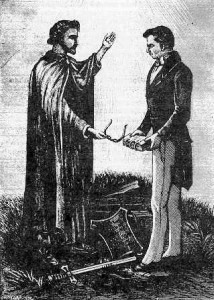
For example: If in 2016 a man or woman were to make any of the claims that Joseph Smith made — “I saw God!” “God told me to start a new church!” “I received golden plates from an angel but he told me to hide them!” “The Book of Mormon is an ancient record of Native Americans!” — or were to do any of more controversial things that Joseph Smith did, such as marry 30+ women, several of whom were either under 18 or married to other men, lose (misappropriate?) people’s financial investments, claim to translate ancient documents using a rock/hat, translations that are subsequently denounced as completely wrong by modern linguists — my guess is that you would not take this person seriously for a second, and instead might even seek legal recourse, especially if it were your wife or daughter that he was seeking to marry.
But when it comes to these sorts of claims or behaviors occurring within your own faith tradition, it appears as though you and others are much more willing to “give Joseph a pass” — and either look the other way, or find justifications that you would otherwise never bother to make in other modern contexts.
And so I wonder to what extent it is possible for you or other “believers” to be reasonably “objective” about scientific and historical evidence when family, social ties, and even occupation can be so tightly interwoven into one’s beliefs.
Please know that I mean no offense by these questions. They are just questions I often have now that I have lost my belief and see the world in a totally different light.
Patrick: Right. I can’t speak for all Mormons, but here’s what I would say. I think it’s absolutely true that “secularism” is a dirty word in most corners of contemporary Latter-day Saintdom. People hear and understand “secular” to be equivalent to “anti-religion” or “militant atheism.” Certainly there are modes or varieties of secularism that are indeed hostile to religion and religious believers. We’ve seen this in the news recently, for instance, when French authorities were forcing Muslim women to remove their modest clothing at a beach.
But here’s what I would say to any believing Mormon. Your faith in Jesus Christ or belief in the reality of gold plates didn’t get you to step on that airplane. The Bible doesn’t contain the formula for the vaccines you give your kids. We can make arguments about in what ways Christianity contributed to the development of the scientific method, but the fact is that we all live in a world in which we operate by secular rules, and benefit from the many, many advances that have come about because of secular (i.e. non-religious) thinking.
Simply put, the intellectual, political, and social foundations of the modern society that we all benefit from — democracy, religious freedom, science and technology — are secular. We need to be honest about that. Secularism isn’t bad — it’s the air we breathe. Mormons should be especially grateful for secularism, because without the First Amendment, which is a secular manifesto, there would not have been the environment in which Mormonism could have been born and thrived.
So we just need to be clearer about what we mean by “secular” and “secularism” in any given usage. Personally, I have very little sympathy for the so-called “New Atheists” and their outright hostility to religious belief and believers. But I’m tremendously grateful for all the benefits that a secular society has brought us — not least the value of religious tolerance.
To your second question, as to whether people “turn off their rational minds” when they step into church, I think that’s an old canard that isn’t particularly fair to religious people — any more than the canard that secular people can’t be ethical or moral. Certainly, some religious people are anti-intellectual — but lots of non-religious people are too. For most of Christian history, theology was considered the “queen of the sciences.” The whole point was to encounter God rationally, not just experientially or mystically. Just read Augustine or Aquinas.
Now, do I have to use a different part of my brain when I open myself up to non-rational, non-verifiable religious claims and experiences? Yes. But as I said earlier, I think that’s part of what makes us human — authentically encountering a world of wonders, from love to poetry to religious mystery, that requires us to approach reality in a different way. I sincerely believe that we as humans can have our cake and eat it too. We can be hyperrational in one moment and open to mystery and divinity the next. Some people will see contradiction; I see complexity.
I should say, if I’m going to make these claims — and I do — then I believe I have to open them up to all humans, not just Mormons. This might make me a little unorthodox, but I have no problem believing that other people have encountered the divine in ways that are just as authentic and real as my fellow Latter-day Saints have. I have no problem believing that Bernadette may well have seen Mary at Lourdes, or that Muhammad was visited by the angel Gabriel. And I think those experiences were real, not just figments of their imagination or psychoses.
We can get into the specifics about Book of Mormon historicity, etc., in later blogs. But from your perspective, can you allow for someone to believe in a world of wonders — angels, gold plates, etc. — without considering them to be crazy?
John: Patrick, to be honest, there’s a huge part of ME that still wants to believe in God, angels, healings, miracles, and an afterlife. If those things were/are true – so much of the sadness in life can be discarded, knowing that all will ultimately be redeemed and restored! In fact, a huge part of my personal downfall with regards to the LDS church was in never being able to personally replicate any of the wonderful storie or miracles that I heard about at church. If God was willing to appear to Joseph Smith, why couldn’t he appear to me? If Jesus could heal people, why couldn’t I heal my dying uncle or cousin? And over time, I became frustrated that while a limited number of church leaders were able to claim these experiences — all of whom were ‘on the payroll’, so to speak — neither I nor anyone I knew in the “real world” were able to obtain these sorts of experiences. So yes — I can completely relate to the desire to believe in these sorts of things. I tried for so. long.
And while I LOVE and personally embrace the idea that you/we can be both rational, evidence-loving creatures AND open to mystery/wonder/the divine — I still feel as though orthodox and progressive Mormons are willing to give Joseph Smith and LDS church truth claims far more latitude than they would anyone/anything else in their own, immediate, material existences.
So yes, I agree that it might be useful to discuss specifics in a few future blogs — not to engage in a back-and-forth, since I loathe such conversations as I know you do — but instead to understand at a deeper, more specific/Mormon level how you approach balancing reason and faith. Deal?
Patrick: Absolutely, we need to get into more specifics. I think it’s a great question of whether Mormons (including myself) are willing to give Joseph Smith or Mormon history a pass in some areas that they would outright condemn or scoff at if the same situations applied to, say, Muhammad and Islamic history.
“Belief” has been used to cover a multitude of sins. Insofar as it has, it has undermined its very own religious project. So many people have lost faith because of what they have seen that faith be complicit in or make excuses for. So I think the challenge for a modern believer is how to encounter God without losing one’s critical faculties or excusing the inexcusable.
Another thing we’ll have to take up is whether a loss of faith in Mormon particulars means scuttling the entire religious/Christian/theist project. So much to talk about!
Mormonism: Inside and Out is an ongoing conversation between Patrick Mason, Chair of Mormon Studies and Associate Professor of Religion at the Claremont Graduate University, and John Dehlin, a psychologist, social activist, and founder Mormon Stories Podcast who was excommunicated from the Mormon church in 2015.
Learn more about Patrick, John, and this project here.

